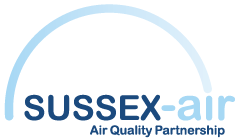
The report first analyses the health impact on respiratory hospital admissions of moderate, high and very high days in Sussex over the period 2006 -2011, as this is the effect that an alert service is intended to reduce. Theoretical calculations estimated an impact of around 740 - 760 respiratory hospital admissions in the whole Sussex population of 1,563,000, including 120 COPD admissions and around 4 -5 asthma admissions in children.
The estimated benefits of the airAlert service as currently operated are small but the numbers of people to which the service was provided at the time of the analysis was also small (around 560 signed up directly). If provided to the whole of the Sussex population, and 67% took action that was 100% effective, around 250 respiratory hospital admissions could potentially be avoided over a 6 year period if actions were effective.
The above findings used studies of the effects of air pollution in general in large cities to make theoretical predictions of the likely effects in Sussex. To study the effectiveness of air pollution alert services directly would not just look for a total change in admissions but need to detect a small difference between groups that did or did not receive the service amongst the general variation in numbers of hospital admissions. This is why large numbers would be needed. In addition, subjects would need to be studied individually. This report estimated that around 618,000 people would need to be studied, just under half the population of Sussex, in order to be sure that there was a clear difference in numbers of hospital admissions between those that did or did not receive the service. Due to the numbers required, such a study is unlikely to be feasible at a county level.
This does not mean that the service is not potentially justified, as the incremental costs of air alert messaging are low and there may be additional benefits in avoiding other health outcomes (respiratory symptoms, cardiovascular admissions and even death in subjects that are severely ill). The work quantifying potential impacts on health in this project should provide useful inputs to compare the costs with the benefits of such services. Focus group research by others suggested the majority of people signed up to the airAlert service considered it helped them to manage their symptoms by actions such as avoiding polluted areas and carrying their asthma medication with them, increasing it as necessary.
Item date 15/10/2014
Follow Us
Our newsletter
 Privacy Notice Summary:
Privacy Notice Summary:
- Who this is for: You must be at least 13 years old to use this service.
- What we collect: We store your email address
- Who we share it with: We use "Campaign Monitor" to store it, and do not share it with anyone else.
- More Info: You can see our full privacy notice here
AirMail newsletter
The latest news and research from ERG: View the archive

